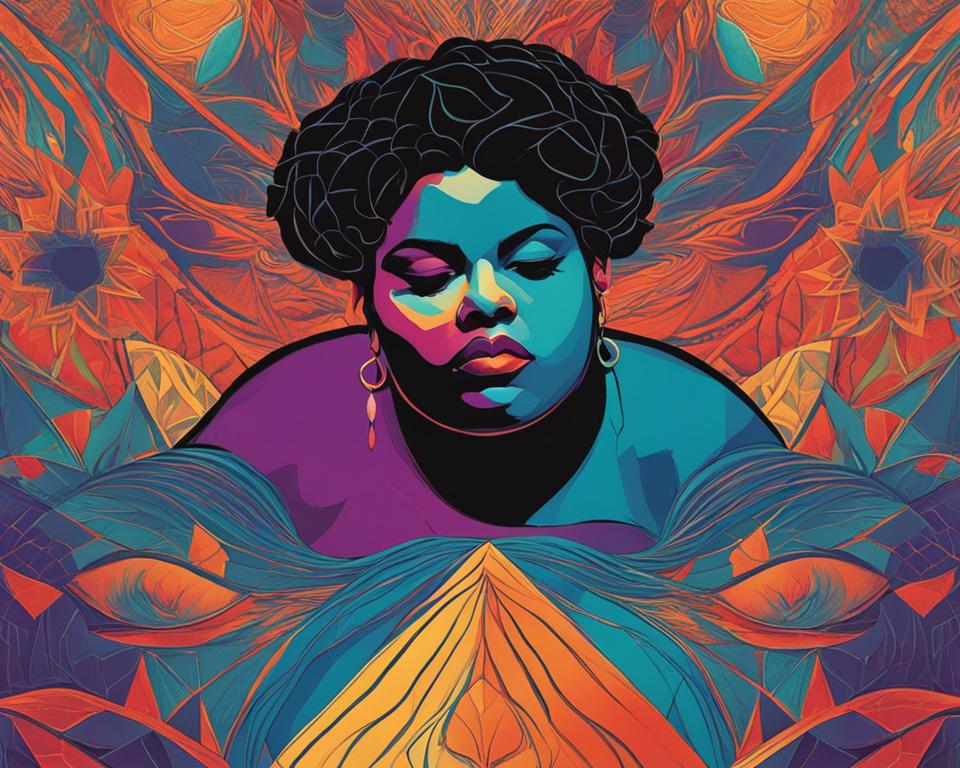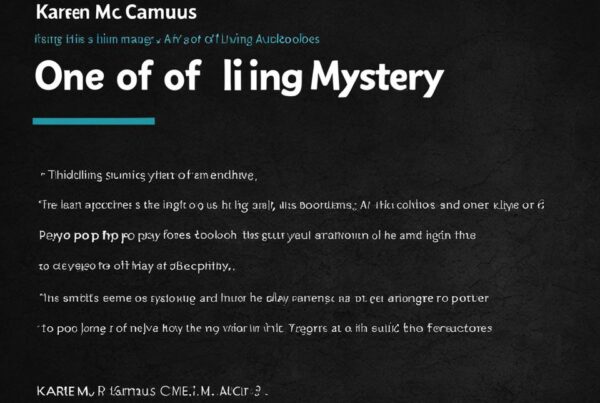If you are looking for a profound and introspective reflection on body image and self-acceptance, look no further than Roxane Gay’s “Hunger: A Memoir of (My) Body.” In this audiobook, Gay shares her deeply personal experiences with the challenges and triumphs of living in a body that does not conform to societal norms.
Throughout this review, we will explore the main themes and messages conveyed in “Hunger,” as well as analyze the author’s writing style and the emotional impact of her storytelling. Join us on this journey as we discuss the critical reception and awards received by this powerful memoir, and offer a recommendation for potential listeners.
So, sit back, relax, and let us take you on a journey through Roxane Gay’s inspiring and thought-provoking world of “Hunger: A Memoir of (My) Body.”
Overview of “Hunger: A Memoir of (My) Body”
Roxane Gay’s “Hunger: A Memoir of (My) Body” is an exploration of the author’s personal experiences with body image, trauma, and self-acceptance. As a memoir, this powerful audiobook delivers a raw and honest portrayal of Gay’s life and the challenges she has faced, making it a must-listen for anyone seeking a deeper understanding of these themes.
Gay is an accomplished writer, professor, and cultural commentator. In “Hunger,” she draws upon her experiences as a woman of color, a survivor of sexual violence, and a self-described “unruly” body to confront cultural norms around fatness and beauty. As such, her audiobook is a vital contribution to the growing body positivity movement.
Throughout “Hunger,” Gay invites the listener into her world, using a conversational and confessional tone to facilitate an intimate listening experience. Her writing style is immersive and engaging, drawing the listener further into her narrative with each passing chapter.
The themes explored in the book are deep and multifaceted, ranging from the impact of sexual trauma on one’s relationship with their body to the societal pressures that perpetuate negative body image. However, at its core, “Hunger” is about liberation and self-love, making it a powerful resource for those who struggle with their own body image or who seek to improve it.
Writing Style and Narration
Roxane Gay’s writing style and narration in “Hunger: A Memoir of (My) Body” are exceptional. Her prose is both nuanced and powerful, drawing the listener in with its raw honesty and vulnerability. The author’s candid self-reflection and introspection turn this audiobook into a moving and immersive experience, one that stays with the listener long after the audiobook has ended.
The narration by the author herself adds an extra layer of intimacy to the listening experience. Her voice conveys the depth of emotions and struggles that she has experienced, enhancing the empathy and understanding already present in the text. The combination of the author’s writing style and narration provides a unique and engaging audiobook experience that listeners will find unforgettable.
“My body is a cage, a prison house where I am both the inmate and the jailer.” – Roxane Gay
Themes Explored in “Hunger: A Memoir of (My) Body”
Roxane Gay’s “Hunger: A Memoir of (My) Body” is not just a personal story, but also an exploration of body image, self-acceptance, and trauma. At its core, the book challenges societal norms regarding bodies, particularly those of women.
The themes of the book are emotionally raw and powerful. Gay shares her personal experiences of sexual assault, which had a profound impact on her relationship with her own body and led to self-destructive behaviors. Her journey of healing and self-acceptance, as outlined in the book, reflects how trauma can affect one’s body in unimaginable ways and how difficult it can be to rebuild a healthy relationship with oneself.
In the audiobook, Gay dives deep into how body image and self-worth can be shaped by external factors, such as media and societal expectations. She shares her own experiences from childhood and young adulthood, recounting how she felt like an outsider due to her weight and how this pushed her towards overeating.
Gay’s vulnerability and honesty resonates with many readers and listeners, as they can relate to her struggles and insecurities. The book speaks to a broader audience about the importance of self-love and self-acceptance, regardless of external appearance.
The overall message of the book is clear: all bodies are worthy of acceptance and love, and individuals should not be ashamed of the way they look. “Hunger: A Memoir of (My) Body” is a powerful exploration of self-discovery, self-acceptance, and the challenges that people face when confronted with societal norms about body image.
Emotional Impact and Resonance
One of the most striking aspects of “Hunger: A Memoir of (My) Body” is its emotional impact. Roxane Gay’s candid and introspective writing style allows readers to connect with her personal struggles in a deeply resonant way.
The book addresses issues of body image and self-acceptance that many people can relate to, regardless of their own life experiences. Through her raw storytelling, Gay evokes empathy and understanding in readers, who may come to see their own struggles in a new light.
“Whenever people talk about how hard it is to lose weight, I want to punch them in the face.”
– Roxane Gay, “Hunger: A Memoir of (My) Body”
Her nuanced portrayal of the internal and external barriers to embracing one’s body resonates with readers on a profound level. It provides a window into the complexities of a pervasive issue, one that many people may face daily, but struggle to put into words. “Hunger” accomplishes this in a way that feels both authentic and universal.
As we reflect on our own relationships with our bodies and the way we perceive others, the resonance of Gay’s memoir is hard to ignore. It is a powerful reminder of the importance of self-acceptance and the impact that societal expectations can have on our lives.

Representation and Intersectionality
The power of “Hunger: A Memoir of (My) Body” lies in its intersectionality and representation, as Roxane Gay shares her experiences as a queer, Black woman. Her narrative challenges societal norms and elevates the voices of those often silenced in mainstream media. Through her memoir, Gay portrays the impact of intersecting identities, highlighting the unique challenges that come with living at the intersection of multiple marginalized communities.
Gay’s story also emphasizes the importance of diverse representation in literature. Her memoir sheds light on the struggle of navigating the world as a person who doesn’t fit traditional ideals of beauty and normalcy. It illustrates the devastating impact of unhealthy beauty standards perpetuated by media, societal expectations, and internalized self-hatred.
The Intersection of Race and Body Image
Gay’s memoir is particularly meaningful for audiences because it addresses the intersection of race and body image. Critical to this discussion is the impact that cultural beauty standards have on individuals from different ethnic backgrounds. Gay writes about her experience with physical trauma as a young girl, and how it led to her using food as a coping mechanism. She discusses how the intersection of her race and size impacted the ways in which she was perceived and treated by the world around her.
“As a woman of color, I’ve had to learn how to navigate the world already feeling like an outsider, learning that it is my job to fit into mainstream spaces, and accept them without question or critique. It’s a very damaging way to exist in the world, but it is also a privilege and I carry that privilege with me even as I struggle against it.” – Roxane Gay
The Importance of Intersectional Literature
Representation and intersectionality in literature are essential in creating a world with greater empathy and understanding. It’s crucial to see characters with a range of backgrounds and experiences, not just the traditionally represented ones. Gay’s memoir speaks to the importance of intersectional literature and increases diverse representation in the literary world, making it an important work that is sure to be thought-provoking and impactful for years to come.
Critical Reception and Awards
Since its publication in 2017, “Hunger: A Memoir of (My) Body” has received widespread critical acclaim, solidifying Roxane Gay’s place as a prominent voice in the literary world.
The book has been featured on multiple bestseller lists, including The New York Times and The Guardian, and has been praised for its poignant and powerful exploration of the author’s personal experiences. Critics have noted the raw honesty and vulnerability present in Gay’s writing, as well as the book’s capacity to inspire empathy and understanding in readers.
The memoir has also received several prestigious awards, including the National Book Critics Circle Award for Autobiography and the Ohioana Book Award for Nonfiction. Its impact on the literary community has been significant, with many praising its contribution to the body positivity movement and its intersectional approach to exploring issues of self-worth and acceptance.
Comparison to Other Works by Roxane Gay
Roxane Gay is a prolific writer with numerous published works in various genres, including essays, novels, and memoirs. In this section, we will compare “Hunger: A Memoir of (My) Body” to some of Gay’s other works, highlighting similarities and differences in themes, writing style, and overall impact.
“Bad Feminist”
“Bad Feminist” is a collection of essays that cover a range of topics, including politics, race, and pop culture. Like “Hunger,” it explores personal experiences and insights through a feminist lens. However, while “Hunger” focuses on body image and self-acceptance, “Bad Feminist” is more broadly concerned with cultural criticism and the ways in which feminism intersects with other aspects of identity.
“Difficult Women”
“Difficult Women” is a collection of short stories that explores the lives and experiences of marginalized women. Like “Hunger,” it deals with themes of trauma and resilience, but through fiction rather than memoir. In terms of writing style, “Difficult Women” showcases Gay’s skill in crafting concise yet powerful narratives that pack an emotional punch.
“An Untamed State”
“An Untamed State” is a novel that explores the kidnapping and rape of a Haitian-American woman. Like “Hunger,” it deals with themes of trauma and survival, but through a fictionalized account that allows for greater dramatic tension. “An Untamed State” also highlights Gay’s ability to craft complex characters with rich psychological depth.
| Title | Genre | Themes | Writing Style |
|---|---|---|---|
| “Bad Feminist” | Essay collection | Feminism, politics, pop culture | Personal, cultural criticism |
| “Difficult Women” | Short story collection | Marginalized women, trauma, resilience | Concise, emotional |
| “An Untamed State” | Novel | Trauma, survival, complex characters | Dramatic, psychological depth |
Overall, Roxane Gay’s body of work showcases a rare ability to weave personal experiences with social and political commentary. Whether through memoir, essays, or fiction, she consistently addresses themes of trauma, resilience, and identity.
Conclusion
Overall, “Hunger: A Memoir of (My) Body” is a profoundly moving audiobook that explores important themes of body image, self-acceptance, and trauma. Roxane Gay’s writing style, combined with her powerful narration, makes for a truly impactful listening experience.
Through her personal story, Gay sheds light on the challenges faced by many individuals who have struggled with body image and the societal pressure to conform to certain standards. By sharing her vulnerabilities and struggles, she provides a compassionate and empathetic perspective on the issue.
Our final thoughts on this audiobook are overwhelmingly positive. We recommend it to anyone interested in memoirs, body positivity, or narratives that challenge societal norms. It is an essential listen for those looking to broaden their understanding of diverse experiences and gain a deeper appreciation for self-acceptance.



